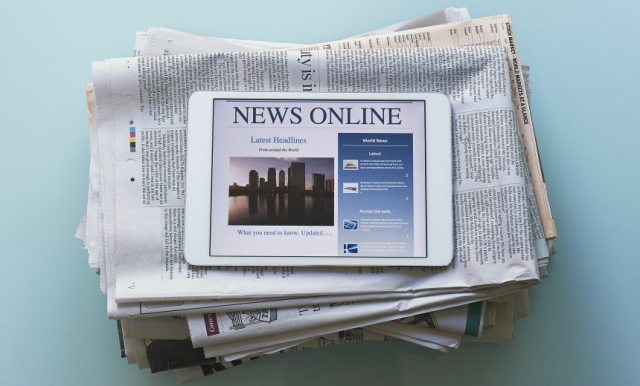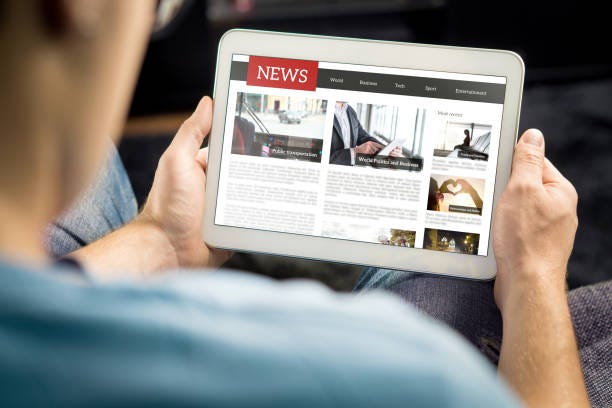Online News Can Be Fun For Anyone
Table of ContentsAn Unbiased View of Online NewsFascination About Online NewsThe 3-Minute Rule for Online NewsFacts About Online News UncoveredThe 10-Minute Rule for Online News
For example, figures for the percentage of individuals paying for on the internet information were within the margin of mistake for both surveys. Let's first think about individuals that have accessibility to information that you would normally have to spend for. It makes good sense to begin here because some people have accessibility to paywalled information with cost-free tests, via their job, and so forth.There are various types of accessibility, yet the 3 most usual are subscriptions to online news from a single brand, subscriptions to a print/digital bundle from a single brand, and a membership to several brand names aggregated in one location. Of these, digital-only registrations to a solitary brand name are the most common type of gain access to in all 3 countries.
Paid news collectors are reasonably prominent in the United States, mainly thanks to Apple News+, but at the minute these are far much less usual than memberships to single news brand names. As we saw in the Exec Recap, people mainly have accessibility to among a little group of prominent brand names. In the United States, over half of these people have accessibility to either the New York Times or the Washington Post, and in the UK, it's The Times or the Telegraph.
Some Known Details About Online News
Most of this team have gain access to because they are paying for memberships with their own cash 75% in Norway and the UK, and 84% in the US. Online News. For under-45s the number is lower. Yet among those 45 and over, the substantial bulk of those who have access are paying with their own money.
In the United States and especially Norway, many authors have introduced paywalls, which suggests more individuals will certainly be asked to pay probably increasing a sense of shortage and producing a feeling that information could be worth spending for. In the UK, by comparison, only a relatively tiny number of publications attempt to bill for information.
Hereof it interests contrast the various factors customers provide in the USA and United Kingdom for spending for online news. On the whole, the most crucial factor is the diversity and high quality of the content. In both countries, clients believe they are obtaining far better info than from complimentary sources.

The 30-Second Trick For Online News
These added aspects seem to be especially important for retention as they build habit and are much less replicable elsewhere. For Norwegians as well the distinctiveness of material prevailed along with convenience and convenience of usage. 'Aftenposten is a serious paper with terrific quality', stated one participant, yet it was striking that 'sustaining good journalism' is less of a motivation (21%) probably because traditional media electrical outlets are seen as less polarised in Norway.
Furthermore, around half of those who currently have totally free access say that they might begin paying if their open door runs out. This is motivating, and maybe more motivating still is that these figures indicate retention rates that are equivalent to those for memberships to video clip and audio streaming services like Netflix and Spotify.
It can additionally be seen as a valuable tip that individuals do not necessarily subscribe for life, and boasts regarding the variety of 'brand-new subscribers' may not be informing the entire story (Online News). There's significant 'churn' in this field, as many individuals finish their totally free tests before they have to pay, or merely cancel their memberships to invest their money on other points
Female, 37, Norway It cost method also much and I can get round the paywall. Male, 36, United States Too pricey, felt there was nothing I could not obtain free of cost on Apple Information. Women, 19, UK In the UK, the number of people that utilized to have actually accessibility to paid news (10%) is close to the number of individuals that presently have access (9%) with the comparable numbers from the US and Norway greater still (albeit less than the number of people with accessibility).
The 7-Second Trick For Online News
As we've already seen, existing subscribers are fairly delighted, yet with earnings from electronic advertising and marketing unclear several authors will certainly be looking to increase the variety of brand-new clients. In contrasting our 3 nations we see some intriguing distinctions that can educate author methods. We observe a very high percentage (40% in the United States and 50% in the UK) that say that nothing could encourage see them to pay.
Yet in Norway, where rate of interest in information has a tendency to be higher and where totally free information is much more my explanation restricted just 19% state they couldn't be encouraged. Cost and convenience are several of the crucial elements that can make a distinction. In Norway, a third (30%) state they might subscribe if it was cheaper and 17% if they can pay to gain access to multiple sites from a solitary repayment.
Publishers have progressively been providing differential rates to choose up business from those not likely to pay full rate (e.g. abroad clients and pupils). Paying to prevent intrusive promotions is an additional possible course for authors, with around one in 7 participants in all 3 nations claiming this this could lure them to subscribe.

The Facts About Online News Revealed
The concern of missing out can be a powerful barrier. Some electrical outlets currently ask readers to register with them in order to be able to access a tiny number of short articles free of charge. Many journalists would see this as a fair compromise, yet the public are much more careful. In all 3 nations fewer than half believe registering is a fair trade, however it's likewise clear that people are not strongly opposed either.
Between 13% and 22% in our three nations state they signed up to access news content in the in 2014. Some are likewise making use of various other strategies to navigate paywalls such as resetting cookies, altering their web browser settings, and even downloading and install dedicated software application. Simply a 3rd say they have actually ever before tried to do something like this, as it needs a specific degree of electronic proficiency, and numerous are most likely not aware that is an opportunity.
Individuals have various sights concerning the civil liberties and wrongs of trying to sidestep paywalls. Few would certainly say that this is always understandable, however some people do have bookings around official site crucial public-interest journalism only being available to those eager and able to pay for it. A paywalled expos of the UK federal government's handling of the coronavirus episode by the Sunday Times caused a heated discussion regarding the concern on Twitter, with some attempting to openly share the complete short article.